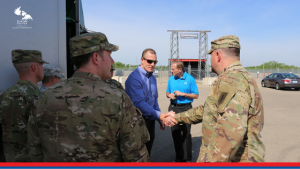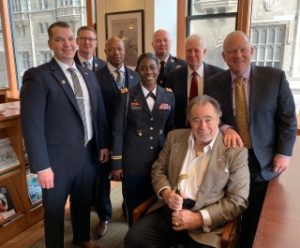 Even with record-low unemployment, it’s a myth that service members who get out of the military will find employment right away.
Even with record-low unemployment, it’s a myth that service members who get out of the military will find employment right away.
That’s where the Teamsters Military Assistance Program (TMAP) comes in. TMAP has been engaged in the transition of military soldiers into civilian sector careers since 2008.
What differentiates this program from others is its close cooperation with the Armed Forces, particularly the Army’s Soldier for Life Program, to develop a defined pathway toward employment in advance of a service member leaving the military. This allows a newly-minted veteran and successful TMAP program graduate the opportunity to secure a private sector job before he/she leaves the military.
The Teamsters, who represent hundreds of professions and thousands of contracted employers requiring state credentials, are also working with state lawmakers to recognize the certifications and credentials those transitioning into the civilian sector have earned while on active-duty.
 Michael “Mick” Yauger, National Director of TMAP, is a passionate advocate for veterans and military families. He recently sat down to talk about TMAP and how other organizations might expand this model.
Michael “Mick” Yauger, National Director of TMAP, is a passionate advocate for veterans and military families. He recently sat down to talk about TMAP and how other organizations might expand this model.
What do you see as the biggest impediments to employment when a service member gets out?
Employers recognize a college degree as verifiable proof of knowledge. But they don’t recognize a DD214 [military discharge papers specifying experience] as proof that you know what you’re doing. This is especially important with credentialing. Think about all the professions that require a credential – truck drivers, fire fighters, pilots, auto mechanics. So many of those in these industries get their experience in the military.
I’m not saying that because you drove a truck for the military it should automatically qualify you for certification, but it should count for something and it shouldn’t be an impediment to successfully transitioning from the military to the civilian workforce.
Since the inception of TMAP, and due to partnering efforts specific to CDL licensure, the nation now recognizes transitioning service men and women who hold a military CDL license. Some states offer an even exchange of the license; in others, it is a waiver. We hope to soon see more credentials recognized by state regulators and credentialing entities. For example, we are now exploring an even exchange for pilots and licensed mechanics as well as reciprocity for nurses and teachers.
What differentiates TMAP from similar programs?
First off, this is a program that starts before the service member exits the military. We provide We recruit and train right where they’re stationed. Next, if candidates pass our program – and it’s not automatic, you have to work for it – they are now extremely competitive for a job at the location of their choosing. Now they have a defined pathway to more than just a job, but to a meaningful career.We’ve also updated our program to add military spouses.
Why does this program work?
This program specifically works with companies that not only provide good wages and great benefits, they go beyond by offering a career ladder – promoting from within.
There are certain companies that truly understand what service members bring to the table.For instance, Tim Thorne, CEO of ABF Freight, who served as an infantry officer started his career out on the docks with ABF. His understanding of vets goes beyond what they did in combat. In fact, that’s just a small part of their career skills. For Tim, it’s about what military members are taught: Work as a team. Never leave a buddy behind. Stay drug- and crime-free. That’s the kind of employee that every employer wants but is increasingly impossible to find, and Tim puts them on the front-line, working face-to-face with his clients.
Last thoughts…any anecdotes that made you sit up and think, “This is working, we are doing a good job.”?
As a Vietnam veteran, I am proud to sit at the table and offer resources to our younger service members as they return home. I’ve never slept better than the time I had a young kid come up, tell me I recruited him for TMAP and now he just got his first home. That’s what I’m most proud of. Less than one percent of the population has the smarts, desire, sense of honor, strength and responsibility to wear the uniform. And I intend to do my best until my last breath to make sure that these folks succeed.